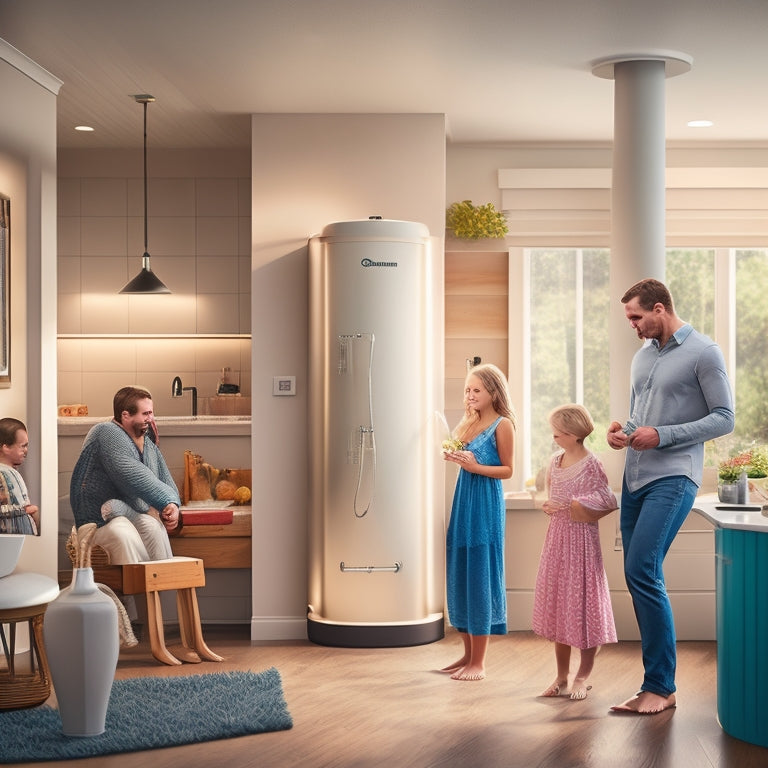
Efficient Water Heating Solutions for Big Families
Share
As a big family, you need a reliable and efficient water heating solution that meets your hot water demands without breaking the bank or harming the environment. Solar water heaters are an excellent option, offering significant cost savings and a reduced carbon footprint. They work by capturing sunlight and converting it into heat, which is then stored in a tank for later use. With various types to choose from, including direct circulation, indirect circulation, and heat pump systems, you're sure to find one that suits your family's needs. By exploring your options further, you can find the perfect solution to keep your family warm and comfortable while minimizing your environmental impact.
Key Takeaways
- Solar water heaters provide a steady supply of hot water for large families while reducing energy bills and environmental impact.
- Energy-efficient designs and advanced insulation minimize heat loss, resulting in lower energy bills and a smaller carbon footprint.
- Heat pump technology achieves efficiency up to 400% compared to traditional electric heaters, making it an attractive option for big families.
- Proper sizing and installation of solar water heaters are crucial for optimal performance, and regular maintenance can prevent efficiency loss.
- Government incentives and utility rebates can help offset the cost of installing efficient water heating solutions, making them a more accessible option for big families.
Benefits of Solar Water Heating
Frequently, homeowners with large families struggle to keep up with their hot water demands, leading to increased energy bills and environmental concerns.
You can break free from these issues by adopting a solar water heating system. This eco-friendly solution greatly reduces your environmental impact, minimizing your carbon footprint and reliance on fossil fuels.
By utilizing renewable energy sources, you can reduce your reliance on the grid and decrease your energy bills. In the long term, you'll reap benefits such as lower energy bills and a reduced dependence on the grid.
By capturing the sun's energy, you'll enjoy a steady supply of hot water while contributing to a cleaner, more sustainable future.
With solar water heating, you can enjoy the freedom to use hot water as needed, without worrying about the environmental consequences.
How Solar Water Heaters Work
You'll want to understand how solar water heaters work to utilize the power of solar energy for your family's needs.
The process begins with solar energy absorption, where solar panels capture sunlight and convert it into heat. This heat is then transferred to the water through a heat transfer process, and the resulting hot water is stored in a tank, pending system installation requirements that guarantee efficient and safe operation.
By integrating solar power into your water heating system, you can reduce your reliance on grid electricity, similar to rooftop solar panels used for EV charging.
Additionally, solar water heaters can be designed to provide a sustainable and eco-friendly solution for large families, much like building-integrated solar systems that power EV charging and minimize grid dependence.
Solar Energy Absorption
As sunlight hits the solar collector, it heats up a fluid that flows through a series of tubes. This fluid is usually a mixture of water and antifreeze, which allows it to withstand freezing temperatures.
Regular maintenance, including cleaning and inspecting connections, is vital for optimizing performance and ensuring longevity, as regular cleaning of solar panels can prevent up to 20% efficiency loss. The key to efficient solar water heating lies in the solar panel efficiency. The more efficient the solar panel, the more energy it can capture from the sun.
Ensuring structural integrity of the installation is essential for optimizing energy production. The heated fluid then flows into a thermal storage tank, where it transfers its heat to the water.
This process allows you to store excess energy generated during the day for use at night or on cloudy days. By maximizing solar energy absorption, you can reduce your reliance on traditional energy sources and enjoy hot water while keeping your energy bills low.
Heat Transfer Process
The heat transfer process in solar water heaters relies on a clever combination of convection and conduction to capture the sun's energy.
You'll notice that the sun's rays heat the solar panels, increasing the temperature of the fluid inside. This warm fluid then flows through a network of pipes, where it comes into contact with a heat exchanger. The heat exchanger's high thermal conductivity allows it to effectively transfer heat to the water, warming it up.
Similar to how high-efficiency solar panels can increase energy yield substantially, the heat transfer process in solar water heaters maximizes the sun's energy. By fine-tuning the panel angle, energy production can be adjusted for peak water heating.
As you use hot water, the cooled fluid returns to the solar panels, and the cycle repeats. This continuous process guarantees a steady supply of hot water for your family's needs.
System Installation Requirements
Optimizing system installation is essential to utilizing the full potential of solar water heaters. When planning your installation, you'll need to take into account the system capacity required to meet your family's hot water demands. This involves calculating your peak hour demand and selecting a system that can handle it.
Additionally, adopting solar energy solutions can drastically reduce energy expenditures, leading to significant cost savings cost efficiency and financial incentives.
Installation location is also vital, as it affects the system's performance and longevity. You'll want to choose a location that receives direct sunlight for most of the day, ideally facing south or west.
Confirm the installation site is structurally sound and can support the weight of the solar panels. By carefully evaluating these factors, you'll be able to maximize the efficiency of your solar water heater and enjoy the freedom of reduced energy bills.
Advantages Over Traditional Systems
You'll find that modern solar water heaters offer significant advantages over traditional systems, primarily due to their energy-efficient designs and space-saving solutions.
These innovative features enable you to reduce your energy consumption while still meeting your family's hot water demands.
Energy Efficient Designs
High-performance water heaters boast sleek, compact designs that minimize heat loss, a stark contrast to traditional systems that often resemble bulky, inefficient relics of the past.
You'll appreciate the design innovations that prioritize energy efficiency, allowing you to enjoy hot water while reducing your energy consumption.
These state-of-the-art designs incorporate advanced materials and insulation, ensuring that heat is retained and not wasted.
As a result, you'll experience faster hot water recovery, reduced standby heat loss, and a lower energy bill.
By choosing an energy-efficient water heater, you're not only saving money but also doing your part for the environment.
With these innovative designs, you can enjoy the freedom to use hot water whenever you need it, without worrying about the environmental impact.
Space Saving Solutions
By downsizing their footprint, modern water heaters free up precious space in your home, making them ideal for large families.
You can now allocate this newly available space to other essential appliances or even create a more open living area.
Tankless options, in particular, offer a significant reduction in size, making them perfect for cramped spaces.
Compact designs also enable you to install water heaters in non-traditional locations, such as under sinks or in crawlspaces, further increasing your flexibility.
Solar Water Heater Types Explained
Since utilizing solar energy to heat water is a cost-effective and eco-friendly solution, understanding the different types of solar water heaters is vital for big families.
You'll want to take into account the following solar water heater types:
-
Direct Circulation Systems: These systems pump water through solar panels, heating it directly. They're ideal for families with low to moderate hot water needs.
-
Indirect Circulation Systems: In these systems, a heat transfer fluid is used to heat water in a storage tank. They're suitable for larger families or those with high hot water demands.
-
Drainback Systems: These systems use a mixture of water and antifreeze to heat water, then drain the fluid back into a storage tank for reuse. They're a good option for families with varying hot water needs.
When choosing a solar water heater, take into account factors such as climate, hot water usage, and available roof space to guarantee you select the most efficient system for your family's needs.
Heat Pump Technology Explained
As you investigate efficient water heating solutions for your big family, you may also consider heat pump technology, which offers an attractive alternative to solar water heaters.
Heat pumps work by utilizing heat from the air or ground to warm water, making them a highly efficient option. They can achieve heat pump efficiency of up to 400%, compared to traditional electric water heaters. This results in significant energy savings and a reduced environmental impact.
Additionally, heat pumps are highly adaptable, allowing them to operate effectively in various climates and environments.
Installation and Maintenance Tips
How efficiently will your heat pump water heater operate if it's not installed correctly?
You've invested in a high-efficiency system, but it's essential to confirm it's installed correctly to reap the benefits.
Create an installation checklist to guarantee a smooth process. This should include:
- Proper sizing: Verify the system is sized correctly for your family's needs.
- Correct placement: Install the system in a well-ventilated area, away from windows and doors.
- Secure connections: Confirm all connections are secure and watertight to prevent leaks.
After installation, establish a maintenance schedule to keep your system running efficiently.
Regular maintenance will help prevent issues, reduce energy consumption, and extend the system's lifespan.
Cost Savings and Incentives
You can considerably reduce your energy bills by switching to a heat pump water heater, which is one of the most efficient water heating solutions available.
By doing so, you'll not only minimize your environmental footprint but also reap significant cost savings.
Additionally, you may be eligible for government incentives and utility rebates that can help offset the initial investment.
For instance, the federal government offers a tax credit of up to $300 for qualifying heat pump water heaters.
Moreover, many utility companies provide rebates of up to $500 for energy-efficient water heaters.
Is Solar Water Heating Right
While heat pump water heaters offer impressive efficiency and cost savings, they may not be the best fit for every large family.
If you're evaluating alternative solutions, solar water heating is worth exploring.
Here are three key factors to evaluate:
-
Solar panel integration: Solar water heaters can be paired with your existing solar panel system, providing a synergistic energy-efficient solution.
-
Family size considerations: Solar water heaters are ideal for larger families, as they can provide a sufficient supply of hot water for multiple simultaneous uses.
-
Climate and location: If you live in a region with abundant sunlight, solar water heating can be a cost-effective option, especially when combined with energy storage solutions.
Frequently Asked Questions
Can I Use Solar Water Heating With My Existing Plumbing System?
As you envision a warm shower on a sunny morning, you wonder if solar water heating fits with your existing setup. Yes, you can integrate it with your current system, exploring various installation options to guarantee seamless system compatibility.
How Do I Ensure Consistent Water Temperature With Solar Heating?
You'll achieve consistent water temperature with solar heating by incorporating a temperature control system, which optimizes solar efficiency by monitoring and adjusting the temperature, ensuring a reliable supply of hot water while maintaining your independence.
Are Solar Water Heaters Suitable for Households With Low Water Usage?
You'll find that solar water heaters are still suitable for your low-usage household, as they can provide cost savings and energy efficiency, even with minimal hot water demands, and their compact design guarantees freedom from high energy bills.
Can Solar Water Heaters Be Installed in Areas With Frequent Shading?
You'll face frustrating fluctuations in solar efficiency when dealing with frequent shading, but don't fret - shading solutions like panel tilting, tracking systems, and strategic tree trimming can help you capture maximum energy and enjoy unbridled freedom from utility bills.
Do Solar Water Heaters Require More Maintenance Than Traditional Systems?
You'll find that solar water heaters require less maintenance than traditional systems, with fewer moving parts and no risk of corrosion, resulting in a longer system lifespan and a more cost-effective solution in the long run.
Related Posts
-

3 Sun-Powered Automated Shades for Energy-Savvy Homes
You're looking to change your home into an energy-savvy haven, and sun-powered automated shades are an essential step...
-

What Do Power Strips Do for Standby Energy?
You're likely aware that your devices, such as TVs and computers, continue to draw power even when turned off, a phen...
-

7 Smart Air Purification Hacks for Energy-Savvy Homes
You can notably improve your indoor air quality while minimizing energy consumption by implementing strategic air pur...


